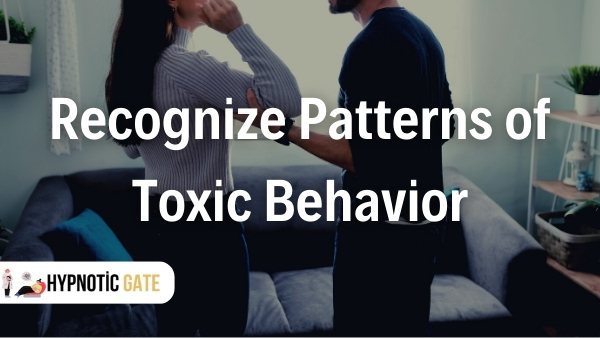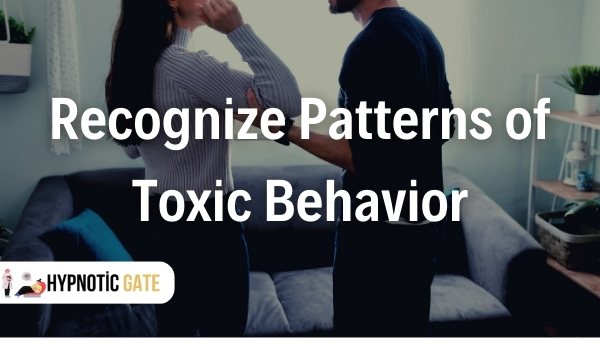As we know that “Recognizing toxic behavior in a partner” is not always easy to notice. However, why this is happen? Well, toxic patterns can often be disguised as love, care, or concern, but it is important to understand that toxic behavior can manifest in various forms, such as emotional abuse, manipulation, control, and negativities.
So, identifying these patterns requires a high level of awareness and a willingness to acknowledge the negative cognitive thoughts and distortions(such as labeling, including self and other blaming) that can be present in a toxic relationship.
As we know that one of the most common patterns of toxic behavior is using the manipulation emotional and mental. A manipulative partner will use tactics such as “guilt-tripping,” “gaslighting,” as well as playing the victim to control and manipulate their partner’s behavior and emotions. Not just like, also may also engage in passive-aggressive behavior, withholding affection or love to punish their partner.
Another indicator of toxic behavior is control. A controlling partner may try to dictate their partner’s actions, monitor their whereabouts, or isolate them from friends and family. This can often lead to feelings of anxiety, depression, and a loss of autonomy.
In some cases, toxic behavior can take the form of emotional abuse. This can involve name-calling, put-downs, or belittling comments that can erode a person’s self-esteem and sense of self-worth. Emotional abuse can also involve threats, intimidation, and isolation.
In this article, we will delve deeper into the details of these toxic behavior patterns and provide practical advice on how to recognize them. It is important to remember that everyone deserves to be in a healthy and loving relationship. Identifying toxic behavior is the first step towards creating a positive and fulfilling partnership.
How Can I Identify if I’m in a Toxic Relationship?

Identifying if you’re in a toxic relationship can be challenging as we talked; why? As toxic patterns of behavior can often be disguised as love or concern. But, we can see some things, which we will explain here in the details.
One of the most common indicators of a toxic relationship is feeling really bad about yourself. If you’re constantly questioning your “self-worth” or feeling like “you’re not good enough for your partner,” as well as emotional abuse, this could be a sign of a toxic dynamic. Beside, this feelings are accompanied by a general sense of sadness or anxiety.
Another sign of a toxic relationship is arguing without solving problems. Positivly talk isn’t bad, but if you find that you and your partner are constantly bickering without actually resolving any issues, this could indicate that there is a deeper issue at play. This type of arguing can leave you feeling drained of energy and frustrated.
A lack of support is another sign of a toxic relationship. If your partner is not supportive of your goals and dreams, or if they constantly belittle you, this can lead to a decrease in self-confidence and a feeling of being unsupported.
Blaming is another red flag in a toxic relationship. If your partner always blames you for their problems or projects them onto you, this can be a sign of a toxic dynamic. This type of behavior can leave you feeling like you’re always on the defensive and can cause a lot of unnecessary drama.
Related: How Can Gratitude Meditation Improve Sleep in People with Racing Thoughts?
How Can I Rebuild My Self-esteem and Self-worth After Being in a Toxic Relationship?
Don’t worry; you can do it.
However, sometimes rebuilding your self-esteem and self-worth after being in a toxic relationship can be a difficult and challenging process. However, it’s important to remember that you are capable of increasing your self-esteem and that there are many ways to do so.
If the toxic relationship has really taken a toll on your mental health, it might be a good idea to seek out the help of a cognitive behavioral therapist. A therapist can help you identify negative thought patterns and provide you with practical tools and techniques to help you rebuild your self-esteem.
One effective method for rebuilding self-esteem is through daily Emotional Freedom Techniques (EFT). EFT involves tapping on specific meridian points on your body while focusing on negative emotions or limiting beliefs. This can help release negative energy and promote a more positive mindset.
Meditation is another powerful tool for building self-esteem. Taking time each day to quiet your mind and focus on your breath can help reduce stress and anxiety and increase feelings of self-worth.
Practicing gratitude is also a great way to boost self-esteem. Taking time each day to reflect on the things you’re grateful for can help shift your focus from negative thoughts to positive ones.
Spending time with loved ones, listening to music, and engaging in creative pursuits like art and writing can also help increase feelings of self-worth and boost your overall mood.
Remember, rebuilding your self-esteem after a toxic relationship takes time and patience. Be kind to yourself and don’t feel discouraged if progress seems slow. With consistency and dedication, you will eventually emerge stronger and more confident than ever before.
What Are Some Red Flags to Watch Out for When Starting a New Relationship to Avoid Repeating Past Toxic Patterns?
When starting a new relationship, it’s important to be aware of potential red flags in order to avoid repeating past toxic patterns. Here are some warning signs to watch out for:
- Rushing into a relationship: If your new partner seems to be moving things along too quickly, this could be a sign that they’re trying to control the pace of the relationship.
- Lack of communication: Communication is key in any healthy relationship. If your new partner seems to be avoiding important conversations or is unwilling to share their thoughts and feelings, this could be a red flag.
- Controlling behavior: If your new partner tries to control your actions, behavior, or appearance, this could signify a potentially toxic dynamic.
- Jealousy and possessiveness: If your new partner is excessively jealous or possessive, this could indicate underlying trust issues or insecurity.
- Lack of respect: Respect is a fundamental aspect of any healthy relationship. This is a clear red flag if your new partner disrespects you or others.
Before starting a new relationship, give yourself the time to heal and rebuild your self-esteem. Beside, when you do start dating again, be mindful of your emotional state and take things slow. Remember that a healthy relationship should be built on mutual respect, trust, and communication.
Other Articles:

